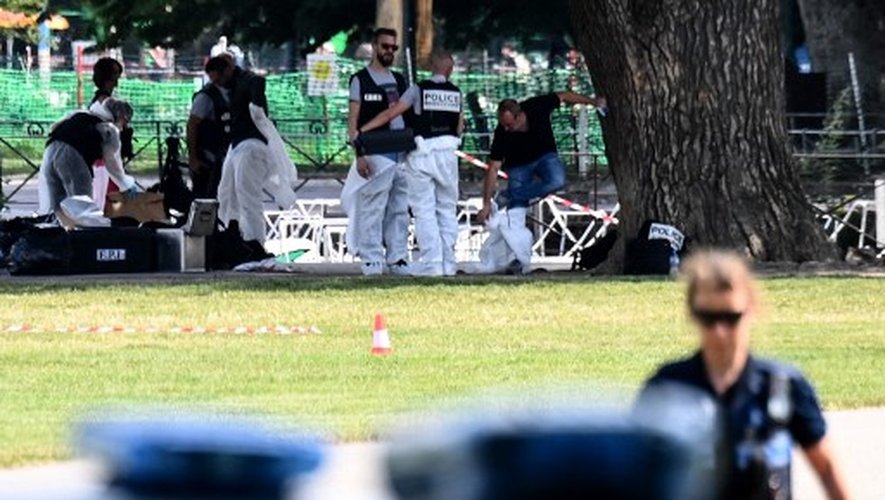All the elements relating to the appalling attack in Annecy will be examined at length by police analysts. The profound psychological impact this work has on them is underestimated.
This article was not written by the editorial staff of La Dépêche du Midi, but taken from the partner site The Conversation.
This June 8, the knife attack which left several seriously injured, mostly children, in Annecy, was filmed by passers-by. These startling images were widely shared on social networks, before being promptly deleted by most platforms.
The vast majority of the population will either not have been able to, or will not have wanted to watch them. There is, however, a category of professionals whose job consists precisely in carefully examining such recordings and delving into the accounts of victims and witnesses (and sometimes of the aggressors) – often at the cost of profound psychological destabilization. These are the analysts working in the police and justice sectors.
Rape, murder, torture, arson, acts of terrorism…: these specialists are regularly confronted with the cruelty and capacity for destruction of humanity.
Experts who work to bring criminals to justice by examining evidence of crimes committed are regularly exposed to the traumatic experience of viewing written testimonies, video footage or audio recordings. And it’s becoming increasingly clear that the systems in place are failing to protect their sanity from the onslaught of atrocities they face.
In Europe, the figures are alarming. In 2022, mental health issues led police officers in England to take 730,000 sick days, up from 320,000 in 2012/2013. In Spain, 28 members of law enforcement committed suicide in 2022 – this is 21.4% less than in 2021, but it is still the second highest number since this statistic was published. raised. The figures are even more dramatic in France – 78 suicides in 2022 if prison guards are included – and in Greece which, although much less populated, recorded 159 suicides among its police forces in 2019.
The situation is compounded by the fact that talking about one’s mental health issues remains largely stigmatised, with officers fearing they will be viewed as ‘weak’ or denied promotion.
To better understand how exposure to traumatic scenes affects police forces, our team of psychologists at the University of Birmingham conducted 40 interviews with experts working on crime investigations in the UK, Belgium, Spain, in the Netherlands and Canada.
Whether they are criminologists, intelligence officers, digital forensics experts or behavioral analysts, these specialists are an integral part of the criminal justice system. They provide valuable analysis, intelligence and support to the investigation and prosecution of the most serious crimes.
Among them, according to our survey conducted earlier this year, 37% were diagnosed as suffering from severe depression and about 55% as suffering from moderate depression.
The echoes of trauma
The people we interviewed said that the constant exposure to traumatic scenes weighed on their perception of the world, but also of their family and social life. Reflecting their general concern for the safety of loved ones, one woman said:
“I worry more than before for my sister if she tells me that she is going for a walk in the evening in a quiet area. »
Our interlocutors describe their behaviors of precaution and avoidance in the face of scenes of which they have read descriptions or viewed images in the context of their work. It affects their lives and those around them. One of them, S. (all participants in our research were anonymized), wonders how he can “leave his children at someone’s house for a sleepover”. With a trembling voice, he admits that he “thinks he is more anxious than a normal parent would be”. For her part, Y. does not leave her phone charger near her bed, because she “thinks that a burglar could use it to [l]’strangle’.
These professionals have to manage intense emotions, and evoke cases of “emotional collapse”. “The testimonies of the victims are painful to read,” sighs Z, fidgeting nervously. “They are told in such detail that when I look at them, I often start crying. »
Many report having “forgotten how to trust”. “I’m more aware of my surroundings socially,” says one man. “I would say I’m more cautious and don’t make friends that easily.” “I became paranoid in my personal relationships,” confides a woman, who continues: “If I went out with a man, I would fear that he would behave like one of the criminals I worked on. »
We found that analysts initially convinced that good things happen to good people and bad things happen to bad people (an approach summed up by the phrase “believe in a just world”) are more at risk than others of depression and depression. post-traumatic stress, probably because they found that bad things often happen to good people and bad deeds often go unpunished.
The indifference of governments
Despite the psychological price they pay for being exposed to these painful scenes, the people we interviewed remain neglected by officials, with their welfare receiving far less attention than that of officers in First line. One of our interlocutors thanked us for our investigation because it meant that we were finally interested in them.
Most of the analysts who spoke to us explained that they had received no training in coping mechanisms for regular exposure to traumatic scenes in the workplace. They feel that the support they have received so far has been mostly reactive, not preventive, and that stigma in the workplace was for many of them a barrier to seeking help.
“The only option available to me is to turn to my loved ones. If I tell my colleagues about it, everyone will know about the difficulties I am experiencing and some will think that I am not able to fulfill my obligations or that I am not made for this job. »
For these professionals to protect us, we must protect them. In addition to our academic research, we have produced two videos to give them a voice and make decision-makers aware of the impact of their work on their mental health.
We are also co-producing a toolkit with practical recommendations for organisations, and working with the UK Police National Wellbeing Group Tier 3 lead, which focuses on the wellbeing of investigators. The aim of our work is to give them a voice and recognition.
In the future, further research will be needed to better understand the risk and resilience factors for these analysts and other professionals who work indirectly with traumatic experiences of others. This will help employers and policy makers to provide them with adequate support.

Created in 2007 to accelerate and share scientific knowledge on major societal issues, the Axa Research Fund has supported nearly 700 projects worldwide, led by researchers from 38 countries. To learn more, visit the Axa Research Fund website or follow us on Twitter @AXAResearchFund.
Fazeelat Duran, Postdoctoral researcher in occupational psychology, AXA Research Fund
This article is republished from The Conversation under a Creative Commons license. Read the original article.

